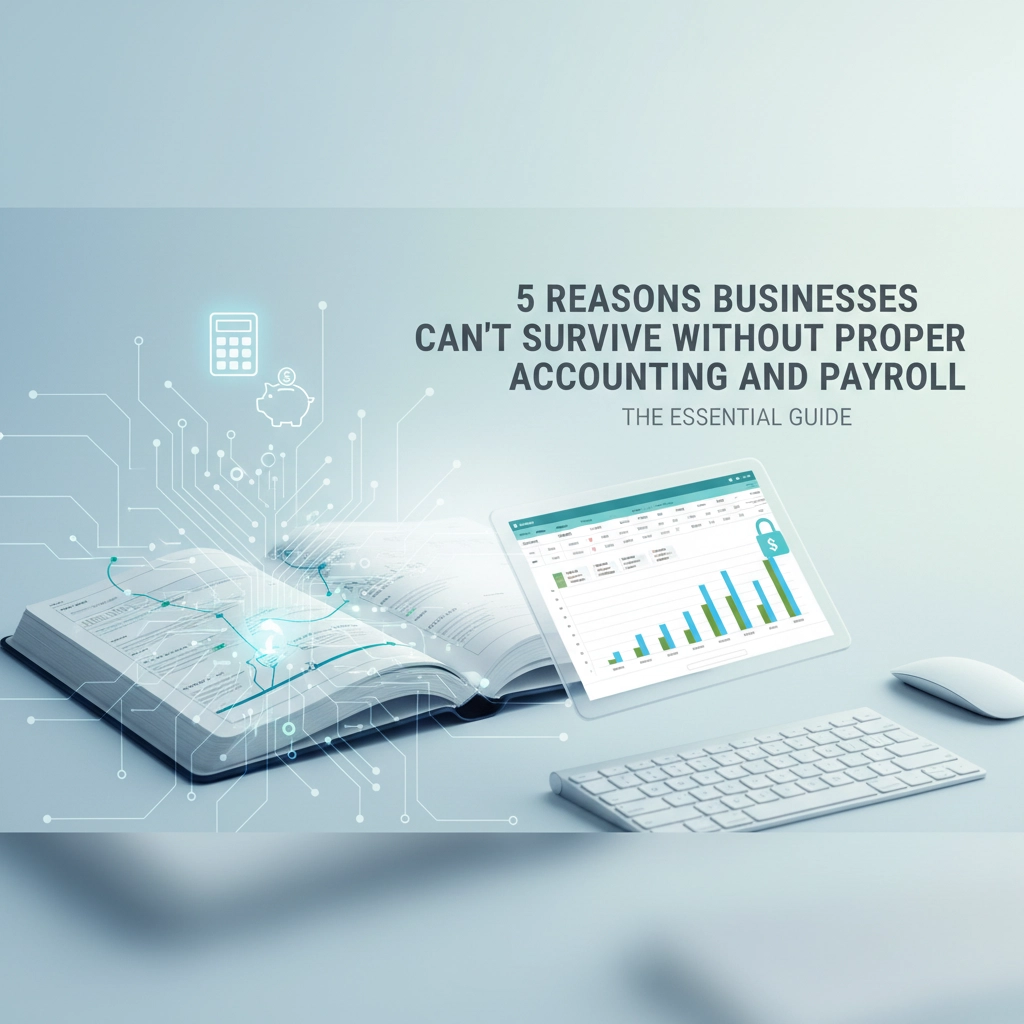
Think accounting and payroll are just boring paperwork that can wait until your business gets bigger? Think again. Every year, thousands of promising businesses crash and burn: not because their products weren't good enough or their marketing failed, but because they ignored the financial fundamentals that keep companies alive.
Whether you're running a small startup from your garage or managing a growing team of 50, proper accounting and payroll systems aren't luxuries: they're survival tools. Here are five critical reasons why businesses simply can't make it without getting these basics right.

Running a business without proper accounting is like driving blindfolded. You might think you're doing fine, but you have no idea if you're heading toward success or straight off a cliff.
The Real Cost of Financial Blindness
When you don't track your finances properly, you lose sight of where your money is actually going. That "profitable" month might actually be putting you in the red once you account for all expenses. That big client payment you're expecting? Without proper accounts receivable tracking, it might slip through the cracks for months.
Small business owners often fall into the trap of thinking they can keep everything in their heads or on scattered spreadsheets. But as your business grows, this approach becomes impossible to maintain. You need real-time visibility into:
The Payroll Piece of the Puzzle
Payroll isn't just about cutting checks: it's about understanding your biggest business expense. Labor costs typically represent 25-50% of a company's total expenses, yet many business owners have no clear picture of their true payroll costs beyond base salaries.
Without proper payroll tracking, you miss critical insights like overtime patterns, benefit costs, tax obligations, and seasonal staffing needs. This blindness makes it impossible to budget accurately or plan for growth.

Tax authorities and labor departments don't accept "I didn't know" as an excuse. The penalties for poor record-keeping and compliance failures can literally shut down your business overnight.
Tax Compliance Nightmares
The IRS requires businesses to maintain detailed financial records for at least three years (and up to seven for certain items). Without proper accounting systems, you're vulnerable to:
Payroll Compliance Complexities
Payroll compliance goes far beyond just paying your employees. You're responsible for:
Miss any of these requirements, and you're looking at penalties that can range from hundreds to thousands of dollars per violation. For a small business operating on thin margins, these penalties can be the difference between staying open and closing doors.
The Domino Effect of Compliance Failures
One compliance failure often leads to another. Late tax deposits trigger penalty assessments, which create cash flow problems, which lead to more late payments and bigger penalties. This vicious cycle has destroyed countless businesses that started with simple record-keeping mistakes.
Your employees have bills to pay, families to feed, and financial obligations that depend on receiving their paychecks on time and accurately. When payroll problems occur, the damage goes far beyond the immediate inconvenience.
The Trust Factor
Nothing destroys employee morale faster than payroll errors or delays. When employees can't count on getting paid correctly, they start looking for other jobs. The cost of replacing good employees: recruiting, hiring, and training: can be 50-200% of their annual salary.
Legal Exposure from Payroll Errors
Payroll mistakes create serious legal risks:
The Ripple Effect on Operations
When employees lose trust in your payroll systems, productivity suffers. People spend time worrying about their pay instead of focusing on their work. They may demand cash payments or frequent pay confirmations. In extreme cases, employees may refuse to work overtime or take on additional responsibilities if they're not confident they'll be compensated properly.

Every successful business reaches a point where growth requires more than gut instincts and good intentions. Without proper financial systems, you hit a growth ceiling that's impossible to break through.
Data-Driven Decision Making
Growing businesses need accurate financial data to make smart decisions about:
Investor and Lender Requirements
Want to secure a business loan or attract investors? They'll demand detailed financial statements, cash flow projections, and payroll records. Without proper accounting systems, you can't provide the documentation needed to access growth capital.
Banks and investors specifically look for:
Scalable Systems
Manual accounting and payroll processes that work for a 5-person company become impossible to manage with 25 employees. Proper systems grow with your business, handling increased transaction volume, more complex reporting requirements, and additional compliance obligations without breaking down.
Running a business always involves risk, but proper accounting and payroll systems help you identify, monitor, and mitigate the financial risks that could otherwise destroy your company.
Cash Flow Risk Management
Cash flow problems are the number one killer of small businesses. Proper accounting systems help you:
Fraud Prevention
Small businesses lose an average of $200,000 to fraud: an amount that would bankrupt most small companies. Proper accounting controls help prevent and detect fraud through:
Liability Protection
Proper payroll systems protect your business from employment-related lawsuits and claims. Detailed records help you defend against:
Insurance and Legal Protection
Many business insurance policies require proper financial record-keeping to validate claims. Professional liability coverage may be void if you can't demonstrate appropriate financial controls and documentation.
You don't need a perfect accounting system from day one, but you do need proper systems in place before problems arise. The businesses that survive and thrive are those that treat accounting and payroll as essential business functions, not administrative afterthoughts.
Start simple, but start right. Use appropriate software, establish basic processes, and don't try to handle everything yourself if you lack the expertise. The cost of proper systems is always less than the cost of financial chaos, compliance failures, or business closure.
Remember: every successful business owner eventually learns these lessons. The question is whether you'll learn them proactively or after a costly mistake. Choose wisely( your business depends on it.)